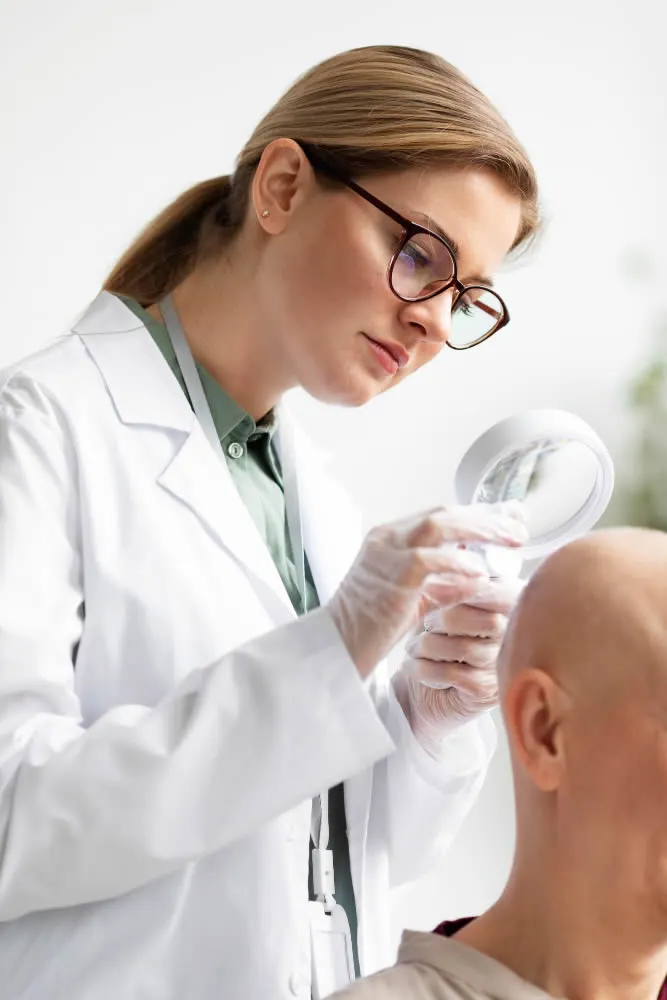What is Kaposi Sarcoma?
Kaposi sarcoma is a type of cancer that affects the skin and mucous membranes, which line various parts of the body including the gastrointestinal tract from the mouth to the anus. This cancer is characterized by the development of purple patches or nodules on the skin and mucous membranes. These growths can spread to lymph nodes and the lungs. Kaposi sarcoma is more commonly found in men and individuals with weakened immune systems.

What are the causes and risk factors for Kaposi Sarcoma?
Kaposi sarcoma is caused by an infection with human herpesvirus 8 (HHV-8), also known as Kaposi sarcoma-associated herpesvirus (KSHV). This virus is responsible for triggering the development of Kaposi sarcoma in individuals who are infected with it. HHV-8 is a member of the herpesvirus family, including viruses like herpes simplex virus and varicella-zoster virus.
Once a person becomes infected with HHV-8, the virus can lie dormant within the body for a long period without causing any symptoms. However, in some individuals, especially those with weakened immune systems, HHV-8 can reactivate and lead to the development of Kaposi sarcoma.
It’s important to note that not everyone who is infected with HHV-8 will develop Kaposi sarcoma. The interaction between the virus and the individual’s immune system and other factors plays a role in whether the cancer develops.
Certain populations are at higher risk for both HHV-8 infection and subsequently Kaposi sarcoma. These include people with suppressed immune systems (such as those with HIV/AIDS or those who have received organ transplants) and individuals living in regions where HHV-8 is more common.
What are the symptoms of Kaposi Sarcoma?
The symptoms of Kaposi sarcoma can vary depending on the location and extent of the cancer.
Common symptoms include:
- Skin Lesions: Kaposi sarcoma often begins with the development of purplish or reddish patches on the skin. These patches can be flat or raised, appearing anywhere on the body. They can grow over time and become nodules or tumors.
- Mucous Membrane Lesions: Lesions can also occur on the mucous membranes that line the mouth, nose, throat, anus, and genital areas. These lesions might cause discomfort, pain, or bleeding depending on their location.
- Internal Lesions: Kaposi sarcoma can develop internally, affecting organs such as the lungs, gastrointestinal tract, and lymph nodes. Internal lesions can lead to symptoms such as difficulty breathing, coughing blood, abdominal pain, or bleeding.
- Swelling: If the lymph nodes are affected, particularly those in the groin, it can result in painful swelling in the legs.
It’s important to remember that Kaposi sarcoma symptoms can vary widely from person to person. Some individuals may have only a few small skin lesions, while others might experience more widespread and severe symptoms.
Symptoms often depend on the specific type of Kaposi sarcoma, its stage, and the individual’s overall health. If you suspect you have symptoms of Kaposi sarcoma, it’s advisable to seek medical attention for proper diagnosis and management.
What is the treatment of Kaposi Sarcoma?
The treatment of Kaposi sarcoma involves a multidisciplinary approach tailored to the type and stage of the disease. Treatment strategies aim to control cancer, alleviate symptoms, and improve overall well-being.
The following are key approaches to treating Kaposi sarcoma:
- Enhancing Immune Function: Strengthening the immune system is a primary focus, especially in HIV-positive individuals. Antiretroviral therapy used to manage HIV can also help control Kaposi sarcoma.
- Local Therapies: For localized lesions, treatments like chemotherapy injections directly into the lesions, cryosurgery (freezing), excisions (surgical removal), phototherapy, or local radiation might be recommended.
- Chemotherapy: Chemotherapy may be necessary for cases where immune enhancement and local therapies aren’t effective. Intravenous chemotherapy drugs are commonly used to target cancer cells.
- Immunotherapy: Immunotherapy, which activates the immune system’s ability to fight cancer, is an emerging treatment option. Clinical trials are investigating its effectiveness in Kaposi sarcoma.
- Supportive Care: Managing symptoms and improving quality of life are integral. Pain management, wound care, and emotional support are essential components of care.
- Regular Follow-Up: Continuous monitoring is crucial for tracking the disease’s progress and detecting any recurrence or complications.
Treatment decisions are made in consultation with a dermatologist, considering the patient’s health status, preferences, and specific circumstances. Individualized care plans ensure the most effective and suitable approach to managing Kaposi sarcoma.

FAQ About Kaposi Sarcoma
Is Kaposi Sarcoma contagious?
No, Kaposi sarcoma itself is not contagious. It is caused by an infection with human herpesvirus 8 (HHV-8), but it is not transmitted through casual contact like shaking hands or sharing items.
Can Kaposi Sarcoma recur after successful treatment?
Yes, Kaposi sarcoma can recur even after successful treatment. Regular follow-up appointments are important to monitor for any signs of recurrence.
Is there a dermatologist near me in Durham that offers treatment for Kaposi Sarcoma?
Yes. At our Durham dermatology office, we offers treatment for Kaposi Sarcoma to patients from Durham and the surrounding area. Contact our office today to schedule an appointment.

